- Home
- Taylor Caldwell
A Tender Victory Page 10
A Tender Victory Read online
Page 10
“Well,” said Mrs. Burnsdale with disapproval, “the mountains are fine. But look where we’re stopping. It’s as bad as I hoped it wouldn’t be.”
Johnny, with dismay, silently acknowledged she was quite right.
A dingy, cindery wooden station, with a crooked sign upon it: “Barryfield.” A long wooden platform, broken, covered with powdery black dust. The same gritty dust darkened the windows of the small station, had settled itself on the one or two lonely elm trees struggling for life near the tracks, had insinuated itself in the crevices of poor railroad buildings surrounding the grassless enclosure, had poured itself on weeds and fences. The train clanged and hooted impatiently as it stopped, and Johnny agreed with it. He had seen no station as dismal as this anywhere in Europe. Even the cataract of golden light from the sky could not alleviate its general air of irresponsibility, dirt, and shiftlessness. Not even the mountains in their regal splendor rising beyond the station could give a small measure of dignity to this indifference to common decency.
The dismal state of the station was not, of course, the direct fault of the people of Barryfield, for the railroad owned this area. But still, had the people demanded that the company clean up and paint up, the company would have had to comply. In every way, thought Johnny, people are guilty of everything mean, malicious, and cruel which happens anywhere in the world, even five thousand miles away.
He made his voice cheerful: “All right, kids! Here’s where we get out. I go first, then Mrs. Burnsdale with Emilie and – Pietro, and then you older kids next. Jean, Kathy goes ahead of you, remember?” He was proud of them, but he was also apprehensive. Neat, clean, handsome, pretty—if one did not look too closely at their eyes. He threw his duffel bag over his shoulder, while a porter came in for the children’s luggage. He started toward the door, then felt his arm caught. He turned to look down at Jean. “Jean carry Papa’s—bag,” Jean said, and he smiled. Johnny gave him the bag at once, with a grave “Thank you.” His heart lifted a little.
The platform gritted under their feet as they descended. Other passengers looked at them curiously from the wide windows of the train. Two trainmen stared at them vacantly. Johnny saw two elderly men emerging from the station, side by side but with a cold and studied distance between them. Since they were regarding Johnny and his flock with a purposeful expression he decided that this was the reception committee.
One of the men spoke in a high and squeaky voice: “Mr. Fletcher? Thought so. Um. I’m Dr. McManus.” He did not extend his hand. He was not a prepossessing man, being so abnormally wide of body that his average height was almost dwarfed, grotesquely. Johnny suspected that all that poundage was hard and solid flesh, under a light-gray suit that did not fit well and was so soiled that the soiling appeared ostentation, tinged with contempt for any local opinion. His broad shoes were cracked and dusty, his linen apparently unironed, his black tie a mere greasy string. Like his body, his face was all wide but fatless flesh, gray in color, the nose short and pugnacious, the mouth hard and lipless. He had tiny eyes, the color of old concrete, under low gray brows. Cynical, merciless eyes, thought Johnny, who was under their scrutiny. When last had that mound of gray-white hair been combed, or washed? Dandruff lay on the mighty shoulders, and this too appeared ostentatious.
The high, squeaky voice, like that of a disagreeable old woman, was ludicrous in so powerful a man, who possessed that vanishing virility of an older America. He ought to be smoking a cigar, or a pipe, thought Johnny. But Dr. McManus smoked cigarettes; one, with a long ash, was dangling from the corner of his mouth, not rakishly, but with an air of cold ferocity.
Dr. McManus turned his harsh scrutiny on the children. He said with heavy disdain, “This feller here is Emil Schoeffel—owns shoe factory. On the church Board; Treasurer. Don’t know why he was elected; hasn’t made such a success, himself.”
Mr. Schoeffel blushed brightly, favored Dr. McManus with a glance that contained both fear and dislike. Johnny was sorry for the elderly treasurer, who seemed to be made of lax string and tall thin boards, hanging loosely together in a haphazard manner. Even his face appeared made of wood, innocently and inexpertly carved, with large and myopic brown eyes, a long crooked nose, a gentle mouth, topped by a partially bald head. He gave Johnny his hand diffidently, and immediately withdrew it. He spoke, and his voice was astonishingly deep, “Welcome, Mr. Fletcher. And these, I suppose—I heard—are the—the children?”
“The foreigners,” said Dr. McManus brutally. He added, “What’s that crippled kid doing hauling that bag around? You aren’t strong enough, parson, eh?”
Johnny controlled himself. “Dr. McManus, this is Jean. He wanted to carry the bag. Please let me introduce them to you. But first, this is Mrs. Burnsdale, our housekeeper, who is going to take care of us. Mrs. Burnsdale, Dr. McManus.”
Mrs. Burnsdale returned Dr. McManus’s stolid look as stolidly. Why, thought Johnny, losing some of his wrath, they resemble each other in a way! Mrs. Burnsdale lifted her nose and said, “Humph. Dr. McManus.” She swung on her solid feet and gave Mr. Schoeffel a kind smile as Johnny introduced her. Mr. Schoeffel, coloring again, took her hand. He was very grateful, and said, “Welcome to Barryfield, Mrs. Burnsdale.”
Johnny went on, helplessly putting Dr. McManus first, in spite of himself, “Doctor, this big girl of mine is Kathy, the little one is Emilie. And this is Max. And now, this is Pietro.”
The children had been gazing at Dr. McManus with inscrutable expressions, which made Johnny dread the worst. But to his surprise they did not appear afraid of the formidable and ugly old man. They extended their hands to him. He stepped back, frowning. Kathy smiled at him serenely, and waited. “Well, then,” he muttered. He took each child’s hand with reluctance and distaste. “This kid looks like a monkey,” he said of Pietro. Pietro grinned, and his brilliant black eyes lighted up and his white teeth shone. “Pietro monkey,” he mocked, and his feet moved briefly in a gay dance.
“He wants to be an acrobat,” said poor Johnny hastily, as Kathy set a heavy hand on Pietro’s shoulder. “But I think he’ll probably be an artist of some kind, or a singer. He’s got a wonderful voice.”
“Is that so?” said Dr. McManus ironically. His eyes studied Kathy again, the pure yellow hair, the sturdy face. A curious spasm touched his mouth, and he turned away from her. He went on to Jean, still defiantly holding Johnny’s bag. “What happened to this young fellow? Why haven’t you done something about that arm and leg?—and you a parson! Waiting for God to cure him, or something?”
Jean said, “Yes, God. Papa said God would cure.”
Johnny, more distressed every moment, cut in: “I’ve had practically every orthopedist in Europe look Jean over.”
“So?” said Dr. McManus, with contempt.
“I have the X rays, and all the reports, doctor.”
“Is that so?” said Dr. McManus, with sarcasm. “I’d like to see them. Just for curiosity’s sake. No fool like a specialist, who knows everything.” He forgot Jean, and now he studied Emilie, who gazed at him with her big, radiant blue eyes. “Emilie?” he said, abruptly. The little child smiled, and her infant’s face became luminous. “Can’t she speak?” the doctor demanded, and there was a note of anger in his voice.
“Not much,” said Johnny simply. “You see, she was probably born in a concentration camp, where her parents were murdered, and no one taught her except me.”
“Poor little thing,” said Mr. Schoeffel, who seemed afraid of the children.
“A Jew, eh?” asked Dr. McManus, and his tone was loaded with affront.
Johnny braced himself against his own anger. “I don’t think so. I think Jean is French, Kathy of Dutch origin, Pietro Italian, Emilie from Belgium. These are surmises, but I think I am correct,” He paused, and put his arm across Max’s shoulders, and drew a deep breath. “Max is of Jewish origin, I think. Max, my next oldest son.”
Dr. McManus’s eyes sharpened on Max, and his broad face tightened at once. Max
regarded him blindly. “Can’t he see?” the doctor asked.
Johnny stepped forward with Max. “Yes, physically. But he isn’t able to see much, yet, of the world. It’s been too terrible for him. You and I, doctor, and everyone else in the world, made it too terrible.”
“Papa?” murmured Max, seizing one of Johnny’s hands.
“Yes, Max, Papa is right here with you,” said Johnny, but he looked at Dr. McManus. He held Max’s hand tightly as Dr. McManus took an abrupt step toward him. Max began to tremble. The doctor seized his chin and looked deeply into the child’s eyes. “Come on, son,” he said, roughly. “Nobody’s going to hurt you, though I don’t know how you’re going to eat on the parson’s salary. Can’t you see me, eh?”
Max turned to Johnny. Johnny nodded. “Dr. McManus,” he said.
Max said slowly, “Dr. McManus.” Then he smiled, and the blind brown eyes sparkled. “I—see,” he said.
Mrs. Burnsdale was astounded. “First time he ever spoke without prodding,” she remarked. “He’s getting better!”
“Nothing wrong with him in the first place,” muttered Dr. McManus. “Thought he was an imbecile, at first.” Now he regarded Kathy again, and again that spasm touched his bitter mouth. “Kathy, eh? Nice, sensible-looking girl. Pretty, too.”
Kathy beamed. “Very pretty,” she said precisely.
“Don’t go and get ideas,” said Dr. McManus with severity. “I’ve seen girls like you grow up to be fat housewives, as bright as bushwomen.” He turned away, as if in disgust, then suddenly swooped Emilie into his arms. The little girl cuddled against him eagerly, to Johnny’s amazement. Mr. Schoeffel peeped timidly at the boys, and cleared his throat. “They all look healthy,” he ventured hopefully, as if he felt some guilt in his heart and wanted to be eased of it.
Dr. McManus squeaked, “Hey, you, Jim, come on over here and help. Get a move on your damned carcass!”
A uniformed chauffeur emerged from the door of the station, hurrying precipitously. “Get those bags into the trunk,” said the doctor. “I don’t know what the hell I’m paying you sixty dollars a week for!”
They all moved toward the station. Mrs. Burnsdale whispered hastily to Johnny, “I think everything’s going to be all right, Mr. Fletcher. I really do.” Dr. McManus was stumping ahead, carrying Emilie, and the children followed him, even Max. Johnny and Mr. Schoeffel brought up the rear. Mr. Schoeffel murmured, “A terrible person, the doctor. I’m a Christian, but I must tell you. He’s a miser, and a bad old man. Not a Christian.”
Johnny looked at the immense back of the doctor. Emilie’s small arms were about his neck; her long hair floated peacefully over one of his shoulders. “Not a Christian?” said Johnny, and smiled.
“Glad we got rid of that moss-mouth,” said Dr. McManus of Mr. Schoeffel, who had driven off in a very elderly car. “Always has a new scheme to get me to spend money. The—town needs another hospital, he says; it needs a new parsonage; the church needs repairing; the orphanage needs more private support.”
“Well, do they?” asked Johnny.
Dr. McManus growled under his breath. The great limousine seemed to glide as if on oil through the dirty and winding streets. The children were very silent on the luxurious seats, and Mrs. Burnsdale had put on her haughty expression again. Dr. McManus said, “Probably. Do they think I’m made of money? If they won’t do anything for themselves why should I help? Eh, parson?”
“You shouldn’t,” said Johnny.
Dr. McManus turned his massive head on his neck in order to survey the young minister. “What? What? Thought you were a parson?” He chuckled in an ugly fashion.
“I am,” said Johnny. “And I also remember the parable of the grasshopper and the ant.” His dark-blue eyes smiled at the old man. “There is nothing in the Bible which approves of a sluggard.”
Dr. McManus contemplated him, scowling. He had lit another cigarette, and it trailed downward from his mouth. He said, “I didn’t want you here. You know that. Frank Stevens put the pressure on me. Perhaps we’ll get along. Perhaps. I give you about six months in this town, though.”
“Why?”
“Because you’re not a fool. Haven’t you learned yet that only fools survive, or thieves?” He chuckled again, and glared through the window. “Filthy town, isn’t it? Hate it, myself. Stupid rats. Maybe you think I shouldn’t call them stupid, parson?”
Johnny replied calmly, “If they are, why shouldn’t you call them that? But stupidity isn’t the sole possession of Barryfield. It’s the universal vice.”
A gleam of evil amusement lit up the concrete of the doctor’s eyes. “Isn’t there something in the Bible about suffering fools gladly? What? And what about that passage which says that he who calls his brother a fool is in danger of hell-fire?”
“Some of our greatest men are stupid,” said Johnny. “But you couldn’t call them fools. Napoleon, for instance, was a stupid man, and so was Julius Caeasar for that matter, and Hitler and Stalin and Bismarck, and a long list of our own Presidents, not to mention some of our Congressmen, and a considerable portion of the philosohers, including Plato and Nietzsche, and Wagner among the musicians, and Darwin among the scientists, and Machiavelli among the sophists.”
“Well, that’s an amazing list,” said the doctor. The long ash from his cigarette fell on his stonelike thighs. “What makes you think they were stupid?”
“Because they lacked compassion.”
The doctor was silent. Johnny began to feel dejected. Barryfield, he decided, was extremely unattractive. The valley in which it lay was quite broad, broad enough to have afforded wider streets and larger lots for the houses. Yet the city had squeezed and cramped itself together meagerly, huddling slummishly as European towns huddled for want of space. There was something European too, something starved, in the narrow wooden houses leaning toward one another, something too old for a vast young land, something out of context with the lofty and expansive mountains, the width of gentle valleys, the numerous streams and rivers. Grimy children played in swarms, milling together, as if there were not, nearby, green earth and tall grass and trees, uncultivated by the farmers who owned them and who probably would have sold the acreage to the town at a reasonable price for a playground.
The city lay under a murk of smoke in the ocher sunset, and now, as the car rolled on, Johnny caught a whiff of a vile odor, a glimpse of a nearby mill from whose gaunt chimneys flags of a bright sulfurous yellow blew out, polluting the air, causing the children to cough. There were other mills, other factories too, all vomiting their corruption against a defaced sky, all black and steamy and rumbling. It was, in a way, good to see that they were busy, that they were employing men at hearths and at machines. But it was not necessary that they should destroy the pure and living oxygen; it was monstrous that children, and the old, breathe this uncleanness.
“Why all the dirt and the smoke?” asked Johnny of Dr. McManus.
The doctor moved his shoulders in a shrug of loathing. “Nobody cares, of course. I’ve been hounding the politicians for years, but they tell me that I’m the only one who complains. But what can you expect from a degenerate people? You’ve been away. Haven’t you heard how degenerate Americans are now? Just about as degenerate as the Russians. Before we start, for instance, calling the Russians atheistic and barabrous, we’d better begin looking around at our own churches, towns and cities. And maybe our government, too—village, town, city, state, and Federal.”
“Dr. Stevens agrees with you, and I’m afraid I do too,” said Johnny. Was Barryfield nothing but slums? True, the mines were only “seasonal” work, but there were factories too, and the factory workers had been making large wages while the young boys had been dying in the war in Europe and in the Pacific. Then Johnny saw an American phenomenon which had its duplicate in no other country in the world: the houses might sift soot and dirt, unpainted, with dirty, uncurtained windows, with patches of grassless, hard-packed earth in front and in the rear, with tilted chi
mneys and broken porches, but almost every house had a brilliant car of impressive dimensions before it, glass shined, chrome glittering, and with curious ornaments on the hoods. The children might seem hardly less emaciated than their brothers and sisters in Europe, and, in many cases, much filthier—but still the cars glittered in the lemon-colored light from the defiled sky, as carefully tended as the household gods of the ancient Romans. Had America indeed deified the machine, as the Russians deified it openly, and without hypocrisy? Was there something to the British contention that America and Russia had too much in common?
“See those cars?” demanded the doctor.
“I see,” said Johnny. Dr. McManus squinted his eyes and peered at him. “Come to the same conclusions I came to?”
“Yes. Doctor, where have our ministers been all these years?”
The doctor shook a tobacco-stained finger in the young minister’s face. “Now you tell me! We’ve had lots of parsons in our church, the Church of the Good Shepherd. Seems to me that my father was the last of the shepherds. Know what the ones we’ve had have been talking about? Amateur psychiatry, or politics. Is that what a minister’s for? Ain’t it his business to try to pound some honor in his congregation, some reverence, some hope, some idea of God, and duty, and charity, and—by God!—some contrition for all the damned crimes men commit against each other and God every day? Ever hear a preacher lately talk about penance? Huh!”
Johnny smiled at the doctor, and his eyes shone with affectionate comprehension. The doctor glared at him, and muttered something obscene under his breath, but he blinked hard for a moment. He knocked furiously on the glass panel which divided him from his chauffeur, and when it slid back he squealed, “Drive down Munston Street, to the corner of Kazinski.” He flung himself back on his seat, glowering. Emilie had fallen asleep in his arms; his blunt and brutal fingers, with the spatulate tips of a true surgeon, roughly stroked her hair.
The car rolled down a particularly cramped, mean street, boiling with children, howling with children, and with sleazy women standing on sagging stoops and porches, shouting back and forth to each other. On the corner stood a small fieldstone church, very neat, pathetically dignified in that squalor, in a patch of lawn guarded by a rope and stakes. Its cross was polished against a sky that was turning a dull and tainted green. My church? thought Johnny, with hope and pleasure. The wooden doors stood open on a cool dusk, and then Johnny saw that it was not his church after all.

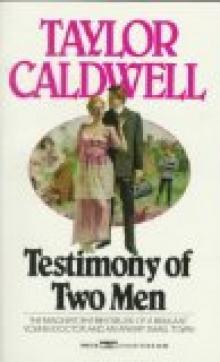 Testimony of Two Men
Testimony of Two Men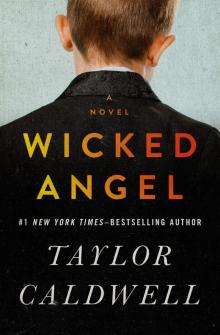 Wicked Angel
Wicked Angel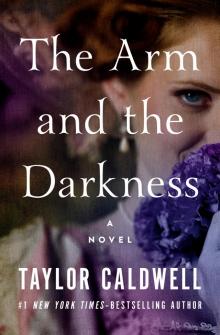 The Arm and the Darkness
The Arm and the Darkness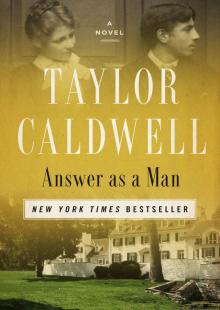 Answer as a Man
Answer as a Man Grandmother and the Priests
Grandmother and the Priests On Growing Up Tough: An Irreverent Memoir
On Growing Up Tough: An Irreverent Memoir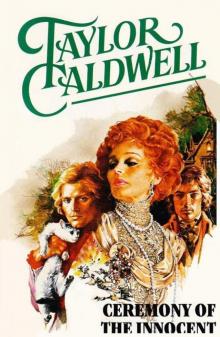 Ceremony of the Innocent
Ceremony of the Innocent The Listener
The Listener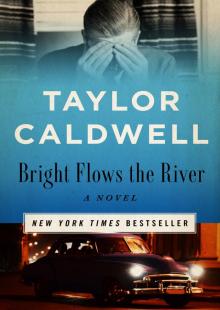 Bright Flows the River
Bright Flows the River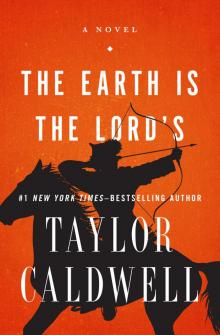 The Earth Is the Lord's
The Earth Is the Lord's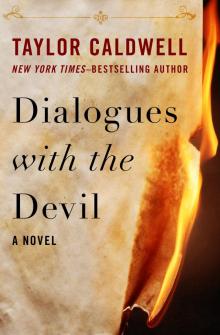 Dialogues With the Devil
Dialogues With the Devil A Tender Victory
A Tender Victory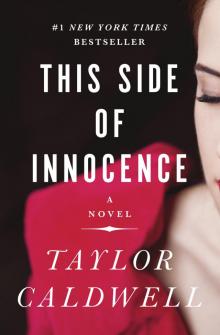 This Side of Innocence
This Side of Innocence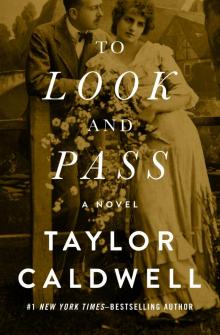 To Look and Pass
To Look and Pass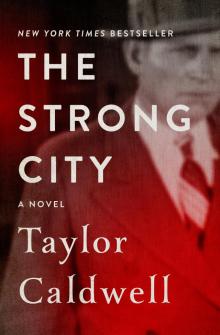 The Strong City
The Strong City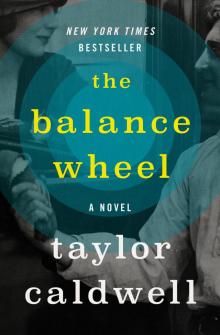 Balance Wheel
Balance Wheel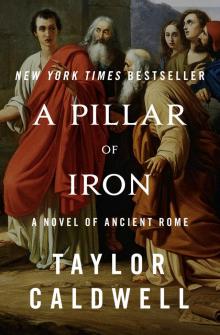 A Pillar of Iron: A Novel of Ancient Rome
A Pillar of Iron: A Novel of Ancient Rome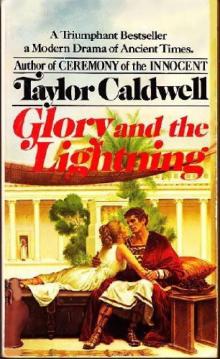 Glory and the Lightning
Glory and the Lightning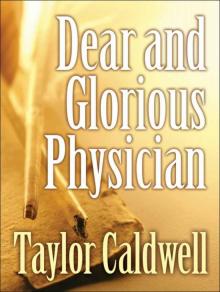 Dear and Glorious Physician
Dear and Glorious Physician The Wide House
The Wide House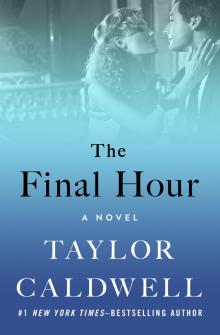 The Final Hour
The Final Hour Never Victorious, Never Defeated
Never Victorious, Never Defeated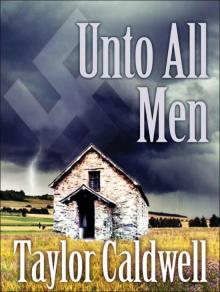 Unto All Men
Unto All Men The Turnbulls
The Turnbulls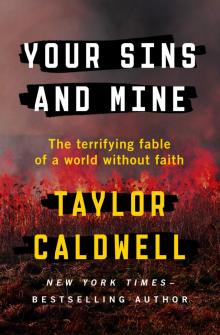 Your Sins and Mine: The Terrifying Fable of a World Without Faith
Your Sins and Mine: The Terrifying Fable of a World Without Faith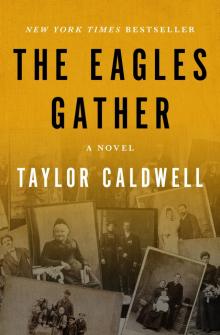 The Eagles Gather
The Eagles Gather Let Love Come Last
Let Love Come Last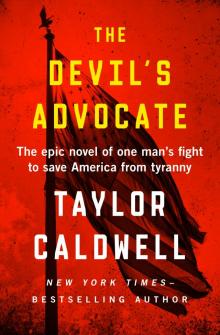 The Devil's Advocate: The Epic Novel of One Man's Fight to Save America From Tyranny
The Devil's Advocate: The Epic Novel of One Man's Fight to Save America From Tyranny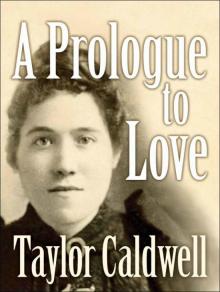 A Prologue to Love
A Prologue to Love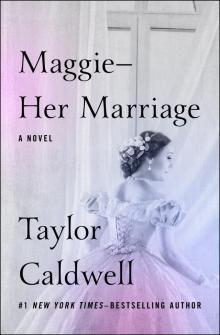 Maggie: Her Marriage
Maggie: Her Marriage The Late Clara Beame
The Late Clara Beame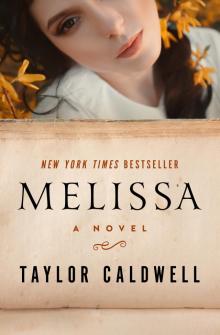 Melissa
Melissa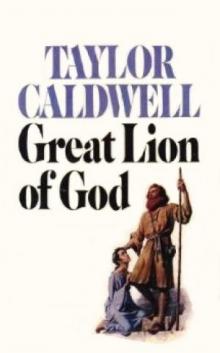 Great Lion of God
Great Lion of God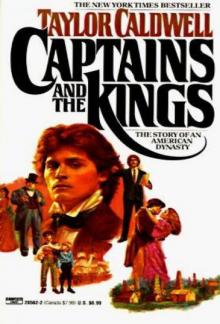 Captains and the Kings
Captains and the Kings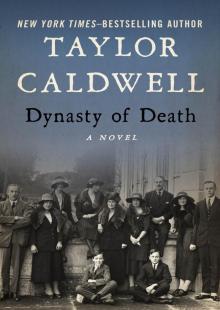 Dynasty of Death
Dynasty of Death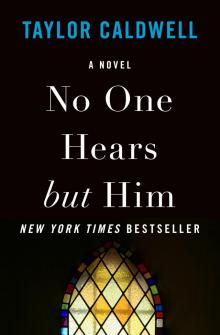 No One Hears but Him
No One Hears but Him The Sound of Thunder
The Sound of Thunder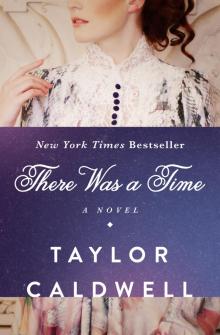 There Was a Time
There Was a Time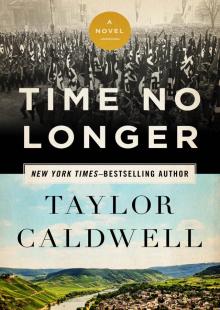 Time No Longer
Time No Longer I, Judas
I, Judas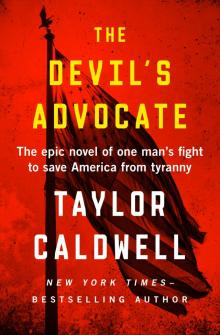 The Devil's Advocate
The Devil's Advocate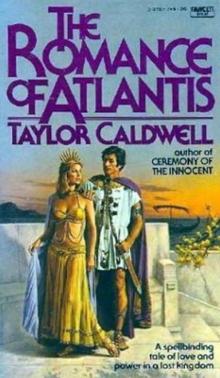 The Romance of Atlantis
The Romance of Atlantis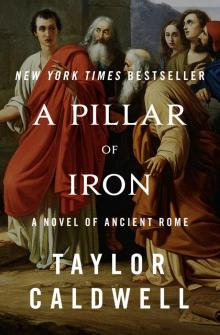 A Pillar of Iron
A Pillar of Iron On Growing Up Tough
On Growing Up Tough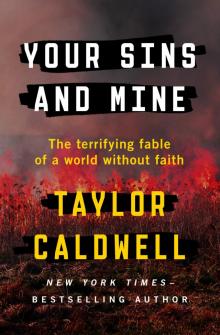 Your Sins and Mine
Your Sins and Mine